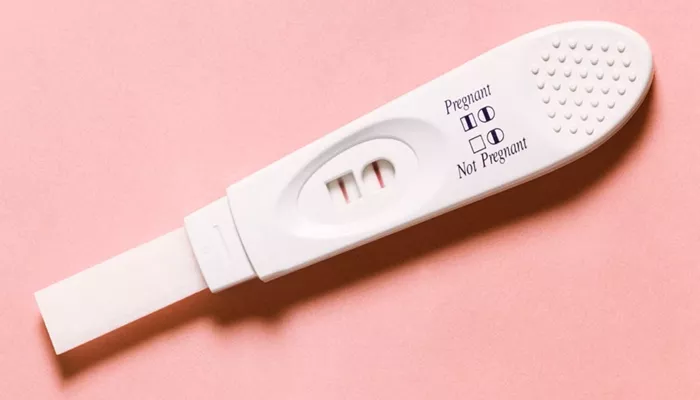Menopause marks a significant life transition for women. It’s a natural biological process that signals the end of a woman’s reproductive years. Typically occurring around age 50, menopause brings changes to hormone levels, menstrual cycles, and fertility. But what happens when a woman in menopause experiences a positive pregnancy test? Can menopause cause this? While rare, it’s possible, and there are a few reasons why this might happen. In this article, we will explore the relationship between menopause and pregnancy tests, clarify the potential causes of a positive result, and answer some common questions.
Understanding Menopause
Before diving into the topic, let’s first understand what menopause is. Menopause is defined as the time when a woman has not had a menstrual period for 12 consecutive months. This stage is marked by hormonal changes, particularly a decline in estrogen production, which leads to the cessation of menstruation. Most women experience menopause between the ages of 45 and 55, although it can happen earlier or later.
Menopause is divided into three stages:
Perimenopause – The transitional period before menopause, usually starting in a woman’s 40s. During this time, hormone levels fluctuate, and menstrual cycles become irregular.
Menopause – The point when a woman has gone 12 months without a period.
Postmenopause – The years after menopause, when symptoms typically decrease but may still cause discomfort.
The Link Between Menopause and Pregnancy
Pregnancy typically becomes less likely as a woman nears menopause. However, it is still possible to conceive during perimenopause, the phase leading up to menopause. This is because, during perimenopause, hormone levels fluctuate, and ovulation (the release of an egg from the ovaries) may still occur sporadically. Therefore, a woman may still get pregnant during this time if she has unprotected sex.
Once a woman reaches full menopause, her chances of pregnancy dramatically decrease, but they are not entirely eliminated until her ovaries stop releasing eggs altogether. While pregnancy becomes increasingly unlikely as a woman approaches menopause, it is still technically possible if she continues to ovulate.
Can Menopause Cause A Positive Pregnancy Test?
A positive pregnancy test means that human chorionic gonadotropin (hCG), a hormone produced during pregnancy, has been detected in a woman’s urine. This hormone is typically produced after a fertilized egg implants in the uterus. So, if a woman in menopause receives a positive pregnancy test, it could indicate pregnancy—although the situation is unusual.
Here are some factors that might contribute to a positive pregnancy test during menopause:
1. Perimenopause and Ovulation
As mentioned, perimenopause can cause irregular ovulation. A woman in this stage may still experience sporadic ovulation, meaning she can still become pregnant. If this happens and fertilization occurs, a positive pregnancy test result would be expected. However, pregnancy is less likely to occur during perimenopause compared to younger women, but it remains possible.
2. Hormonal Imbalances
Even during menopause, a woman’s body is still producing hormones like estrogen and progesterone, though in much lower amounts. Hormonal imbalances may result in false positives or other pregnancy-like symptoms. For instance, certain medications or medical conditions (like ovarian cysts) can sometimes cause elevated hCG levels, leading to a positive test result without a pregnancy.
3. Medical Conditions or Tumors
Certain medical conditions, including some types of tumors, may cause the body to produce hCG. One example is a rare condition known as a “molar pregnancy,” which may occur even in postmenopausal women. This can result in a false positive pregnancy test. Some ovarian or uterine tumors can also produce hCG, giving the appearance of pregnancy.
4. The Role of Pregnancy Tests
While pregnancy tests are generally reliable, they are not foolproof. In some cases, the test may produce a false positive due to expired tests, incorrect usage, or interference from medications. It’s crucial for women in menopause to consult with their doctor if they receive a positive result on a pregnancy test to rule out other causes.
Should You Be Concerned?
If you are in menopause and get a positive pregnancy test, it’s important not to panic. While it’s rare, pregnancy can still occur during perimenopause, especially if you are still menstruating. However, other factors can contribute to elevated hCG levels. It’s always best to confirm the result with a healthcare provider. Your doctor will likely conduct additional tests or ultrasounds to determine the cause of the positive result.
Key Takeaways
Pregnancy during menopause is rare but possible: It’s most likely to happen during perimenopause, when ovulation can still occur.
Hormonal imbalances can cause false positives: Conditions like ovarian cysts or other health issues might raise hCG levels, even if you’re not pregnant.
Medical conditions or tumors: Some tumors can produce hCG, leading to false positives.
Confirm the result with your doctor: If you get a positive pregnancy test during menopause, it’s important to seek medical advice to understand the cause.
Common Questions
1. Can menopause cause a false positive pregnancy test?
Yes, hormonal changes during menopause can sometimes cause elevated hCG levels, leading to a false positive.
2. What other conditions can cause a positive pregnancy test during menopause?
Certain tumors, ovarian cysts, and other medical conditions can cause increased hCG levels, leading to a false positive.
3. Should I stop using contraception during perimenopause?
It’s still important to use contraception during perimenopause if you don’t want to get pregnant, as ovulation may still occur.
In conclusion, while a positive pregnancy test during menopause is rare, it is possible. The most likely time for pregnancy during this stage is in perimenopause when ovulation can still occur. However, hormonal imbalances or medical conditions may also lead to false positives. Always consult your healthcare provider for further testing and clarity. Remember, menopause is a natural phase in a woman’s life, but if unexpected results arise, it’s essential to get professional guidance.
Related topics:
- Can Breastfeeding Help With Postpartum Depression?
- Does Progesterone Cream Help Hot Flashes?
- How Menopause Can Impact Your Joints: Unveiling The Link To Arthritis


